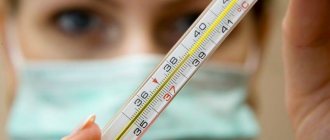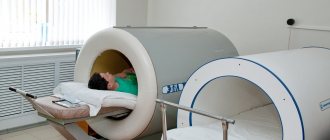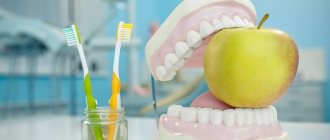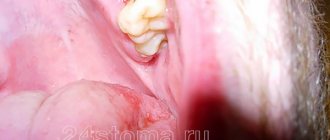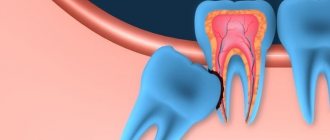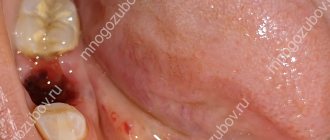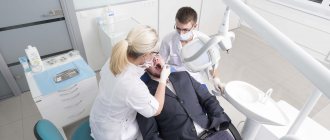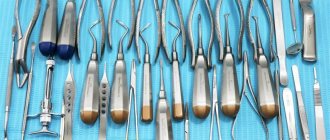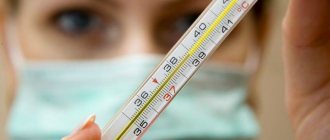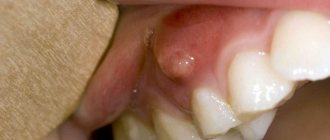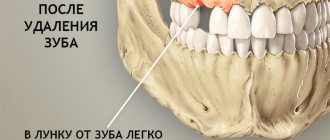Author: Trofimov Andrey Yurievich
What to do after tooth extraction? Every person has gone through this procedure in their life. Doctors always give recommendations, but more often than not, after the pain relief wears off, every second patient forgets about what was told to him in the dental chair. In most cases, after the anesthesia wears off, the pain returns with a vengeance. What should you do if after tooth extraction there is bleeding, the socket, gums become inflamed, or swelling occurs? How to avoid infection and a repeat unpleasant trip to the dentist?
General recommendations
Important restrictions after tooth extraction
Taking medications after tooth extraction
What else should you do after tooth extraction?
Hygiene rules after tooth extraction
What is normal after tooth extraction?
100% Recommendations after tooth extraction
Tooth extraction is, first of all, an operation. Of course, its success depends on the skill of the dentist, but you can speed up the healing process. Follow the doctor’s advice strictly, and very soon you won’t even remember that you visited the dentist’s office. In case you forgot the doctor’s words, here are all the basic recommendations after tooth extraction from the dentists of the ART-Dent clinic.
General recommendations
The most important rule in such a sensitive issue will be timely assistance from a qualified specialist. Therefore, if your tooth suddenly starts to hurt badly, this is not a reason to just take a pill and forget about this unpleasant moment, this is a good reason to go to a dental clinic, where you will be given first aid.
With any removal, complex or ordinary, there are a number of rules that must be followed to speed up the healing of the wound, as well as avoid abscesses and other negative consequences.
- Removing the gauze compress. The doctor leaves cotton wool or gauze after tooth extraction. A maximum of one hour after arriving from the dentist, you must carefully remove the protective swab. If it has dried out and stuck to the gum, do not remove it until you soak the area with chlorhexidine, since careless movement can damage or even remove the clot hiding the wound.
- Pain relief. Any discomfort after tooth extraction is a normal process for which you need to be prepared. Ice or any cool item from the refrigerator will help relieve discomfort. The selected item is wrapped in a towel and applied to the sore cheek. In addition to relieving pain, this action will help reduce the chances of swelling. However, this action also has its limitations: ice can be applied several times, making sure to take a break of 5-7 minutes.
- Eating. In the first few hours after tooth extraction, be it a molar or a chewing tooth, you should not eat any food, even if you are very hungry. Over the next 24 hours, the temperature of the food should only be at room temperature. Food should not be too spicy or salty, this can cause additional irritation of the mucous membrane.
- Limit alcohol and smoking. On the first day after tooth extraction, you should refrain from drinking alcoholic beverages. Even a small dose of alcohol can cause blood vessels to dilate, which will ultimately lead to bleeding from the wound. Smoking is permissible, but again at least 2-3 hours after the operation.
- Applying and removing sutures. If sutures were placed at the dental clinic after tooth extraction, the patient is usually invited for a follow-up appointment in a week. In some cases, the sutures dissolve on their own within two weeks.
- Dental treatment. For those who are now closely involved in treating the entire oral cavity, a reasonable question arises: when can the procedures be continued? If the removal was not difficult, then it will be possible to resume meetings with your doctor after 7 days.
What to do with pain
The main fear before tooth extraction is pain. In fact, the operation is painless, because... takes place under anesthesia, which will remain in effect for another two hours after the procedure. Then the pain will begin to increase. Any painkiller already familiar to you or prescribed by a doctor will help eliminate them.
Most often, doctors advise Ketanov, Ketorol or the most common Nurofen. Mild discomfort continues for a couple of days.
With proper tooth extraction, the pain should not intensify, but if this happens, you should definitely consult a doctor.
A rehabilitologist told how to recover from COVID-19
Leonid Dyakov, a specialist at the Department of Medical Rehabilitation, Sports Medicine and Exercise Therapy at the Rostov State Medical University, a member of the European Association of Outpatient Rehabilitation Physicians, answered RG’s questions.
— When can a person be considered fully recovered?
Leonid Dyakov: After all the symptoms disappeared, normal test results were obtained. And when a person feels that he can return to normal life, fulfill his duties, and nothing limits him: there is no shortness of breath, no palpitations, or other suspicious phenomena.
If something bothers you after being discharged from the hospital or leaving sick leave, you need to consult a doctor. Everyone suffers in their own way. The health consequences can be different, so everyone should have their own set of examinations.
— What tests need to be taken, which organs should be checked?
Leonid Dyakov: It would be good to do a CT scan of the lungs within a year after discharge. There is no need to be afraid of radiation doses - modern devices are practically harmless. Only with computed tomography can complications be detected. It will help identify areas of the lungs that are affected. And then compensation mechanisms can be launched in a timely manner. But it’s still better for the doctor to decide this in the specific situation that the patient has. If nothing bothers you, there is no pain, there is no shortness of breath, there is no point in doing any research.
Also, after discharge, I advise you to do an ECG and urine test, a general blood test with detection of the leukocyte formula, and determination of the relative and absolute number of lymphocytes within a year. Conduct an examination for glycoproteins, which are produced in the liver and indicate the degree of inflammation or tissue necrosis. And also - examine blood serum for changes in the concentration of immunoglobulins. They allow you to establish the general immune status of the body and determine what treatment is necessary.
An important indicator of the functioning of the respiratory system - the function of external respiration - can be studied using spirometry. This is a simple manipulation, it is performed by a pulmonologist. And in home practice, you can use a portable pulse oximeter. A miniature device will determine the oxygen saturation of the blood. This indicator should also be monitored throughout the year; it should become a habit, like measuring blood pressure with a tonometer.
— What to do if test results are abnormal?
Leonid Dyakov: In case of deviations from the norm - in tests, CT scans, ultrasound - it is better to discuss this with a specialist. Some deviations are acceptable. It is better to recover under the supervision of a therapist.
— People who have been seriously ill with COVID-19 talk about damage to part of the lung, sometimes up to 40 percent. Can the organ be restored and what needs to be done for this?
Leonid Dyakov: In fact, the lung tissue is well compensated. Even the alveoli are restored. Nature has insured a person in this case; it is not for nothing that the lungs are a paired organ, and a person can live without problems with one lung. Of course, everything is very individual and depends on many factors. The lower the percentage of damage, the better and faster the process goes.
But unfortunately, the lungs are not the only organ that suffers from the virus. One of the most common complications of Covid is myocarditis, inflammation of the heart muscle. It is especially dangerous because it may not develop immediately, but after a while. The virus attacks the endothelium, the inner “lining” of blood vessels, and the vessels run throughout the body. One of the most vulnerable places is the myocardium. For the same reason, the kidneys may suffer. After all, they are a tangle of blood vessels. If the virus affects them, then problems are inevitable.
— How long can the recovery period last?
Leonid Dyakov: Rehabilitation will take quite a long period, especially if you had to resort to mechanical ventilation. The old Soviet recovery system allowed three months for the treatment of ordinary pneumonia, and this period necessarily included sanatorium treatment.
This was an extremely important stage. Previously, even before the revolution, patients went “to the water” and breathe the air. In some places, balneological technologies and climatic therapy are still preserved. Dry sea, pine air is healing. This is Crimea, Gelendzhik.
Usually, after seasonal acute respiratory viral infections, the body recovers in one to two weeks, depending on the severity of the disease. Recovery from coronavirus infection takes on average from one to 2.5 months. The complications that arise and the general deterioration in well-being after COVID-19 are called post-Covid syndrome.
— They say coronavirus is a call to reconsider your life. What needs to change in life?
Leonid Dyakov: Of course, any illness is a reason to stop, look around, and analyze your life. An inactive lifestyle, bad habits and an incorrect psychological attitude lead to illness - this is no secret to anyone.
— How to eat properly after an illness? Do I need to take vitamins, which ones and for how long?
Leonid Dyakov: Three or four times a day would be good. And that the menu includes fresh fruits and vegetables. At least a couple of times a week protein - fish, meat dishes. In severe cases of the disease, a significant loss of protein proteins occurs in the body. Very important during the recovery period are the fats that make up the surfactant, a substance that prevents the pulmonary alveoli from sticking together. These should be fats of natural origin (not palm oil) - butter, sunflower, olive oil.
And, of course, vitamins. A person receives large doses already during the course of treatment. But even after discharge, it is advisable to take multivitamins with microelements for three months after clinical recovery.
— Vitamins are the same as for illness: vitamin C in a horse dose of 1000 mg? Vitamin D?
Leonid Dyakov: No, rather prophylactic doses in ready-made pills. There are some good complexes. All this should be discussed with a doctor who knows the patient.
— Is it necessary to seek a course in a rehabilitation program or is it better to go to the forest, to the dacha or to the Mineral Waters and just take a walk there?
Leonid Dyakov: With our high pace of life and stress, a couple of times a year you need to get away from your usual life, leave the city to breathe fresh air by the river, in the forest, in the mountains or by the sea.
Most survivors do not need a rehabilitation program. Only if there are severe complications. This is discussed with the attending physician, a therapist at the clinic, who will help arrange sanatorium-resort treatment.
— What exercises will help those recovering?
Leonid Dyakov: Exercises are also selected individually. A universal exercise that I recommend is walking.
If you didn’t walk before you got sick, and then suddenly started, you need to monitor your pulse and exercise.
It is unusual for city dwellers to walk a lot, but for recovery it is necessary. Relatives can join you and organize a two- to three-hour walk for therapeutic purposes. You need to approach this strictly individually; for some it’s just slow walking. Swimming has a good rehabilitative effect: here, in addition to the benefits of breathing exercises, the muscles that support the lungs are also included in the recovery process. But swimming should be swimming, not getting wet in a pool.
— How to restore psycho-emotional balance?
Leonid Dyakov: The most painful topic is psycho-emotional balance. Every patient who has been in a hospital needs help. Some had relatives who were seriously ill, others saw people nearby dying in Covid hospitals - the patient experienced enormous stress. The help of a psychologist may be needed to determine whether the patient needs more serious help. For example, our center deals not only with physical, but also with psychological rehabilitation.
— What can’t be done after coronavirus?
Leonid Dyakov: Drink alcohol, smoke, take on excessive physical activity. This not only prevents the strengthening of the immune system, but also leads to a worsening of the condition. You cannot overcool, neglect proper nutrition, or lack sleep.
Strengthened cardio exercises are contraindicated. And you cannot refuse rehabilitation in case of severe consequences of the disease, accompanied by shortness of breath.
How to avoid bleeding
Immediately after surgery, the dentist will place a gauze pad in the hole to stop the bleeding. You need to immediately clench your jaw tightly and hold the tampon for at least 20 minutes.
If you have high blood pressure or blood clotting problems, you may need to keep the tampon in place for 40 minutes or even an hour.
During this time, a blood clot forms in the hole. It plays a very important role - it protects the wound from bacteria, food debris, and dental plaque, because... their entry into an empty socket can lead to inflammation and infection.
When do you need to see a doctor urgently?
If a high temperature (more than 38 degrees) lasts longer than a day, and severe swelling is observed, accompanied by an unpleasant odor and taste in the mouth, a doctor’s consultation is necessary. You should immediately see a doctor if the bleeding does not stop for more than 10 hours.
Also reasons to contact a specialist are:
- external signs of seam divergence;
- the appearance of pain in the socket that does not subside for more than 3 days, increasing or pulsating;
- mobility of adjacent teeth;
- numbness of the tongue, cheeks and lips;
- soreness of the submandibular lymph nodes.
Do not ignore the recommendations described above, as this can lead to serious complications and long-term treatment, including in a hospital setting.
How to rinse your mouth
Recommendations after molar tooth extraction always include a ban on rinsing on the first day after surgery - this procedure can remove a blood clot from the socket.
In the following days, rinsing with herbs - a decoction of oak bark, chamomile, calendula - will be useful to relieve inflammation and speed up the healing process. Among the medications you can use miramistin, furatsilin or chlorhexidine. A water-salt solution is also suitable.
The rinsing technique is simple: take the solution or decoction into your mouth, hold it for 20 minutes and carefully spit it out. No sudden movements.
Home care
After surgery, you can take antiseptic baths on the first day. To do this, you can use furatsilin, chlorhexidine 0.05% or another antiseptic as prescribed by a doctor.
On the second day, you can already brush your teeth using a soft brush. Be careful not to touch the tooth socket, which should still contain a blood clot. After cleaning, you need to rinse the brush in an antiseptic and place it in a sterile place. On the same day, you can take warm baths based on sea salt. To do this, you need to dilute half a tsp. salt in 250-300 ml of water and add 0.25 tsp. soda
Sometimes doctors recommend baths with decoctions for healing. This can be oak bark, elecampane, sage, St. John's wort, chamomile and other plants.
What and when to eat
You can't eat or drink for the first three hours. First, during anesthesia, you can bite your cheek or tongue. Secondly, the blood clot must harden in the hole.
After this, you can eat, but you should avoid hot, cold, spicy and rough foods. You should absolutely not drink hot drinks: they will not only increase blood flow, but can also dissolve the protective clot.
If the removal was difficult, the dentist will recommend a diet of soft and liquid foods for a day or two.
Chew food with the teeth located on the non-operated side.
What do we have to do
After the removal procedure, you need to limit your activity for a while, adhere to a healthy lifestyle and diet.
It is better to take the so-called “sick leave” - spend time at home in a calm environment, closely monitoring your condition.
Smoking and drinking alcoholic beverages are prohibited; it is better to abstain from them.
The menu for the recovery period should consist of nutritious food that does not require thorough chewing. It is better to reduce the number of meals by increasing the calorie content of dishes.
It is imperative to carry out hygienic procedures, since ignoring them can trigger an inflammatory process in the socket of an extracted tooth.
Mouth rinsing is prohibited; it is better to replace it with medicinal baths.
You need to make sure that the postoperative sutures do not come apart; to do this, you should not open your mouth wide or strain your facial muscles.
You can cool it, but you can’t heat it up.
A cold compress will help reduce swelling and bleeding. But it should be used only on the recommendation of a doctor. Cold is applied through a thin cloth and held for no more than 25 minutes, otherwise hypothermia will occur, which can lead to unpleasant consequences.
Overheating can lead to inflammation or secondary bleeding. Therefore, for some time you need to forget about a hot bath, solarium.
What is allowed to eat
One day after the operation, you can eat soft and warm food. It is recommended not to consume fried, spicy and salty foods. This is because such dishes can lead to injury to the socket or irritation of the gums. The temperature of the food consumed should not be high. Recommended drinks to drink:
- dairy products;
- compotes;
- natural juices;
- still mineral water.
It is better to hold off on drinking hot coffee, tea or very cold drinks with ice.
Is it possible to brush your teeth
Oral hygiene must be observed. But there are a few points worth paying attention to:
- Do not touch the hole with the brush,
- reduce the amount of paste,
- rinse your mouth very carefully and slowly.
And one more thing: never take medications without a doctor’s prescription. In simple cases, medications will not be needed, at most a light pain reliever. In difficult cases, the dentist will prescribe an antibiotic and an antihistamine.
Using these recommendations, you will survive tooth extraction easily and unnoticed. If you have any other questions, call ART Dent dentistry, our specialists will definitely help you.
Baths should be carried out if:
- an incision was made to expose the gumboil;
- the tooth was removed due to inflammatory processes;
- there are harmful deposits on the teeth and caries;
- removal of the root of a tooth with caries
For procedures with baths, you can use an aqueous solution of chlorhexidine with a concentration of 0.05%. This drug is inexpensive, it can be purchased ready-made, it has excellent antiseptic effects, and tastes bitter. Such procedures must be carried out 3 times a day. The solution must be kept in the mouth for 1 minute.
